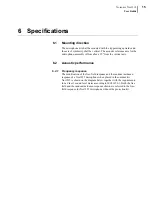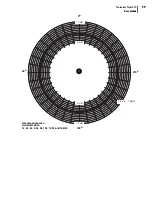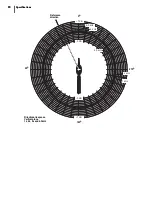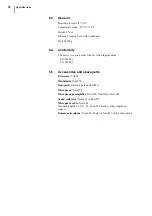
8
Assembling
Adjust the height of the microphone preamplifier assembly to be a
slightly higher than the centre of the windscreen, see figure 3.1.
(Approximately 11 cm). Tighten the fastening nut just enough so that the
preamplifier will not move by its own weight as the microphone will be
automatically located to the right position as the two halves are screwed
together and it is important that the force used is minimal to prevent
damage to the microphone grid. Accurate adjustment of the height of the
microphone is very important to maintain the specification for the
frequency response. Carefully screw on the upper part; this will press the
microphone downward so the top of the microphone grid is placed
accurately at the opening for the acoustic ports. Now carefully remove the
upper part in order not to alter the height of the microphone. Now tighten
the fastening nut using hand force only and do not over-tighten.
The purpose of the base screw is threefold:
Important!
Follow the mounting instructions
carefully; otherwise, the
microphone may be harmed!
•
It is a base for mounting the microphone system on a mast or
tripod.
•
It closes the main body, but has a water drain to let any
condensate escape.
Figure 3.2 The desiccator TA202
is placed between the microphone
and the preamplifier.
•
It forms a tension relief for the cable.
Press the microphone cable slightly towards the preamplifier and mount
the base crew at the lower end of the main body.
After mounting of the upper protection part, the outdoor microphone unit
will be ready for use. However, we recommend that you test the unit
together with the measuring instrument by applying a calibrator before
the upper part is mounted.
3.3
Mounting on a mast
The outdoor microphone assembly may easily be mounted on a
supporting mast that has a mounting stud suitable for connection to the
Nor1212. The dimensions are given in the section dealing with the
specification and are those commonly used on tripods for cameras.
Summary of Contents for Nor1212
Page 1: ...Instruction Manual Outdoor Microphone Kit Nor1212 Im1212_1Ed1R1En May 2004 ...
Page 2: ......
Page 3: ...Instruction Manual Outdoor Microphone Kit Nor1212 Im1212_1Ed1R1En May 2004 ...
Page 6: ......
Page 14: ......
Page 16: ...12 ...
Page 18: ......
Page 25: ......
Page 26: ...P O Box 24 N 3421 Lierskogen Norway www norsonic com ...












































